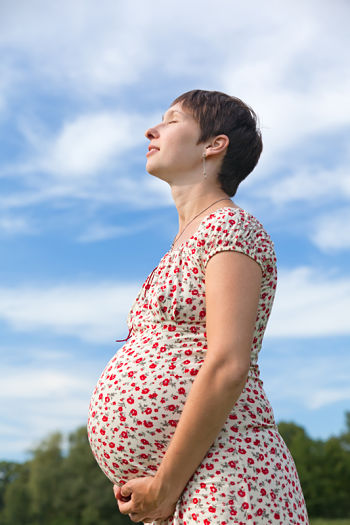Can a Pregnant Woman Go to High Altitudes
Pregnancy and High Altitude
FTC Disclosure: If you make a purchase via a link on this site, I may receive a small commission. There will be no added cost to you. Thank you!
Please note: This page is published for informational purposes only and should NOT be taken as professional medical advice.
We are sometimes asked whether or not a high altitude destination is a safe choice for a babymoon break.
It's not an easy question to answer. Every pregnancy is different and we all react to altitude in different ways. For this reason, we strongly recommend that you speak to your doctor before booking your trip.

High Altitude and Pregnancy - What are the Risks?
The amount of oxygen available to our bodies decreases the higher above sea level we travel. Whilst this shouldn't present problems to anyone up to around 5,000 ft (1,500 m), effects may begun to be felt beyond that.
This is especially true during pregnancy, when your body already has to work harder than usual to support your growing baby.
Signs that you are not getting enough oxygen include...
- Feeling light-headed or dizzy
- Feeling more tired than usual
- Breathlessness
- Headaches
- Nausea
If you experience these symptoms, then it's likely that your developing baby is also receiving less oxygen than he/she needs. Over time, this can lead to problems with baby's growth and development.
Other complications may also arise. Indeed, a survey of Colorado obstetrical care providers revealed that pre-term labor and bleeding complications are the problems most frequently encountered by pregnant visitors to high altitudes.
Pregnancy and Elevation - Which Factors Increase Your Risk?
You should be particularly careful to avoid travel to high altitudes if you are affected by
- pre-eclampsia
- hypertension (high blood pressure)
- history of miscarriage
- anemia
- heart or lung disease
- any unexplained bleeding
- impaired placental function
- any other pregnancy complications
- if you are a smoker
It's also important to note that - if you already suffer from 'morning sickness' - traveling to a high altitude destination will very likely make it worse.
And you should also speak to your doctor if you have gestational diabetes. High altitude while pregnant can interfere with your blood sugar control.
What About Pregnant Women Who Live at High Altitudes?
Research has shown that women who live in high altitude areas have acclimatised to the thinner air and thus their bodies react in a way that preserves the supply of oxygen to their unborn children.
Experts suggest that the metabolism of a pregnant women who lives at a high altitude 'instructs' the fetus to restrain its growth, making them both better able to deal with the limited amount of available oxygen.
This means that any risk to you when you travel to a higher altitude would be greater than that of a local resident.
That being said, women who live at high altitudes have a higher risk of intrauterine growth restriction and pre-eclampsia. Furthermore, their babies tend to be smaller than those born at lower altitudes.
If you already live in a high altitude destination, you will still be at risk if you choose to travel to a destination higher than recommended by medical professionals (see below).
Official Guidelines for Traveling to a High Altitude Destination During Pregnancy
There is some variation in the advice given...
- The British Medical Journal suggests that it is safe to travel up to 3,000m (10,000ft) if your pregnancy is low risk and you are a non-smoker. It goes on to state that there is a lack of evidence for traveling safely to altitudes above 3,000 m.
- NICE guidelines suggest avoiding any travel to high altitude destinations during the first trimester of pregnancy and say it is advisable to have at least one scan prior to travel. This is to confirm a healthy intra-uterine pregnancy. After that, its guidelines recommend short stays of up to 2,500 m (around 8,200 ft), as long as there are no pregnancy complications.
- The CDC recommends avoiding destinations over 12,000 ft.
Pregnancy and High Altitude - Tips to Keep You Comfortable
- Avoid strenuous activity - including heavy exercise, skiing, cycling and climbing - or at least be aware that these will cause a consderable increase in your body's demand for oxygen.
- Ascend gradually, which will lessen the impact of any effects you may experience.
- Have lots of rest and drink plenty of water! Visitors to this site have described how dehydration worsened any symptoms they experienced.
- Make sure that you have easy access to medical help in the area you're traveling to.
- Above all, seek the consent of your doctor before booking and carefully check your insurance poliy to ensure you are covered.
Altitude and Pregnancy Sources
The Pregnant Altitude Visitor
Pregnancy at High Altitude
CDC - Travel to High Altitudes
Return to Top of Page
- Babymoon Guide ›
- Babymoon 101 ›
- Pregnancy and High Altitude
Can a Pregnant Woman Go to High Altitudes
Source: https://www.babymoonguide.com/pregnancy-and-high-altitude.html